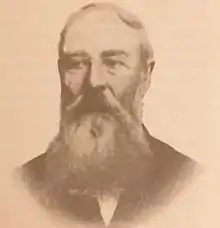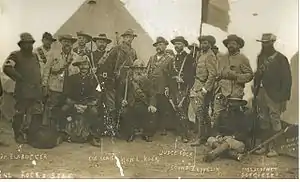Johannes Hermanus Michiel Kock
Johannes Hermanus Michiel 'Jan' Kock (11 March 1835 – 31 October 1899) was a Boer general and politician.[1]
Johannes Hermanus Michiel Kock | |
|---|---|
 | |
| Born | 11 March 1835 Graaff-Reinet, Cape Colony |
| Died | 31 October 1899 (aged 64) Ladysmith, Colony of Natal |
| Allegiance | |
| Rank | General |
| Commands held | South African Republic |
| Battles/wars | |
| Spouse(s) | Catharina Christina Susanna Schoeman |
| Other work | farmer, landdrost |

Life
Kock was born in Graaff-Reinet the son of Johannes Lambertus Kock and Elsje Magdalena Smit.[2] His father was a Boer commandant in Transorangia during the last phase of the Great Trek. His mother was the sister-in law of former president M.W. Pretorius.[3] He travelled in the Great Trek with his parents and already at the age of 10 he accompanied his father at the Battle of Swartkoppies and at age 13 at the Battle of Boomplaats.
After the battle of Swartkoppies the family settled in Winburg and after Boomplaats, Kock and his father were declared outlaws and the family had to leave Winburg and crossed Vaal River and later settled on the farm, Witstinkhoutboom, in the Potchefstroom district. Kock bought this farm from his father in 1889.[1]
At the age of 20 he married Catharina Christina Schoeman on 15 Jul 1854 at Potchefstroom.[4] She was the daughter of Commandant-general Stephanus Schoeman and sister of General Hendrik Schoeman.[3]
As an adult he was a landdrost in Potchefstroom and representative for that district in the Volksraad (the parliament of the South African Republic). He was also involved in church affairs and was largely responsible for the adoption of policies stating that Protestant ministers be paid from state funds. During the First Boer War he distinguished himself as a general in the fighting at Potchefstroom in 1880–1881.[1]
Second Boer War
With the outbreak of the war he was placed in charge of the Johannesburg commando and the German Corps. He invaded Natal and was instructed to blow up the railway lines but did not follow instructions exactly. Instead, he occupied a railway station at Elandslaagte which led to the Battle of Elandslaagte on 21 October 1899. Under his command the Boers lost the battle and Kock was wounded and captured by the British. He died a few days later from his wounds in Ladysmith in the Colony of Natal.[5]
References
- De Kock, W. J. (1972). Dictionary of South African biography: Vol II. Pretoria: Human Sciences Research Council. p. 370. ISBN 0-624-00856-8. OCLC 20937.
- "South Africa, Transvaal, Probate Records from the Master of the Supreme Court, 1869-1958," database with images, FamilySearch (https://familysearch.org/ark:/61903/1:1:QLQ7-V25D : 3 April 2020), Johannes Hermanus Michiel Kock, 1899; citing Probate, Ladysmith, Kliprivier, Natal, South Africa, Pietermaritzburg Archives (formerly Natal State Archives), South Africa; FHL microfilm 1,367,222.
- Grobler, J. E. H. (2004). The War Reporter : the Anglo-Boer War through the eyes of the burghers. Johannesburg: Jonathan Ball Publishers. p. 10. ISBN 1-86842-186-4. OCLC 56776191.
- "South Africa, Netherdutch Reformed Church Registers (Pretoria Archive), 1838-1991," database with images, FamilySearch (https://familysearch.org/ark:/61903/1:1:Q29M-ZVZW : 18 December 2018), Johannes Hermanus Michiel Kock, 15 Jul 1854; citing Marriage, Potchefstroom, Transvaal, South Africa, Nederduitsch Hervormde Kerk Van Afrika (Dutch Reformed Church of Africa), Pretoria; FHL microfilm 1,492,538.
- Gomm, Neville (1971). "South African Military History Society - Journal - The German Commando in the South African War of 1899-1902". samilitaryhistory.org. Retrieved 25 January 2019.
Sources
- Encyclopedia of Southern Africa. Eric Rosenthal. 1967.
- The Hall Handbook of the Anglo Boer War. Darren Hall. 1999. ISBN 978-0-86980-943-3